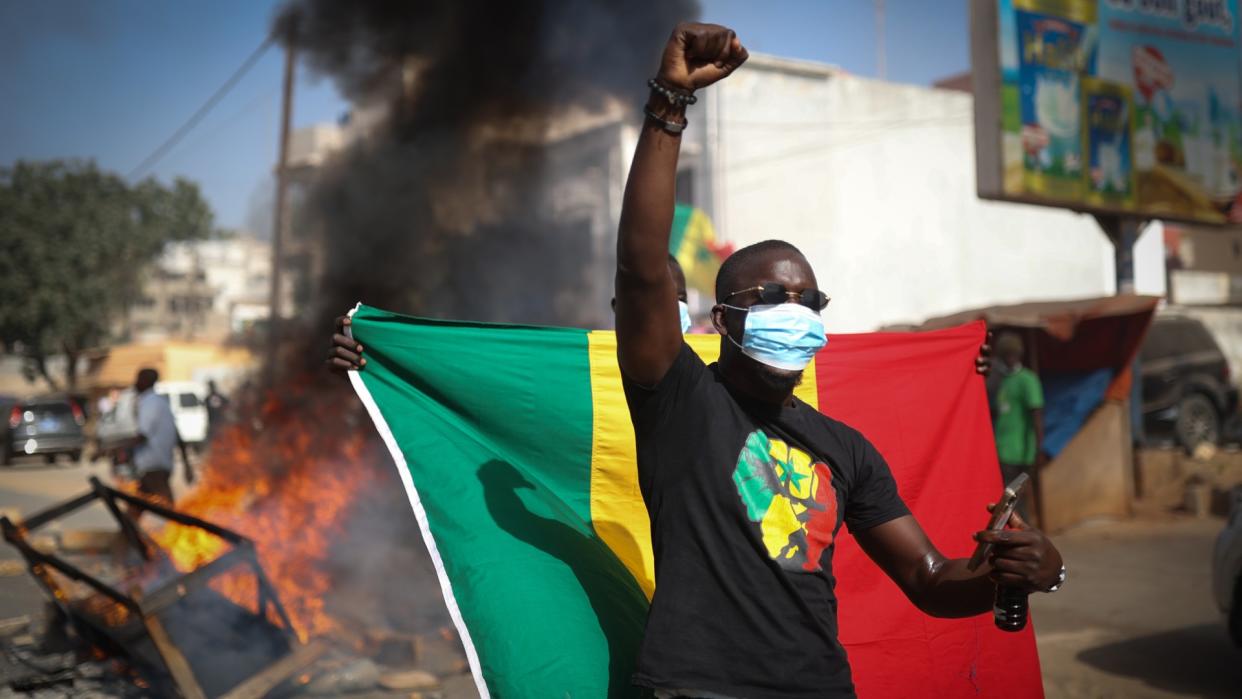Senegal's election postponement puts its democracy in jeopardy

- Oops!Something went wrong.Please try again later.
Senegal has been a bastion of democracy in Africa, a nation that has historically seen peaceful transitions of power on a continent that is often rife with political violence. But that could be changing after a series of parliamentary moves caused riots to break out across the country, putting Senegal's democracy in peril.
The issues began when outgoing President Macky Sall announced a unilateral decree to postpone the country's presidential elections, which had been scheduled for Feb. 25. Sall's plan was officially enacted by Senegal's National Assembly on Monday, delaying the election nearly ten full months to Dec. 15. Sall said the election had to be postponed to investigate "controversies over the disqualification of some candidates and allegations of corruption," The Associated Press said.
The election postponement incited a wave of protests and violence in Senegal's capital city, Dakar, over the weekend, with Sall now expected to stay in office until the new election — far past when his term is set to expire. Some are calling the move an attempted coup and have expressed concerns that it could be the end of democracy in Senegal.
Senegal 'hangs by a thread'
The election postponement has "sparked a constitutional crisis and dealt a blow to democracy across West Africa," The Economist said. It comes as something of a shock in a country that, throughout its history, "has avoided civil wars and coups, and has held a series of largely peaceful and democratic transitions of power," the outlet said.
Even more surprising is that Sall himself has also been a proponent of stability in Africa and has "played a leading role in the attempts by ECOWAS, the [West African] regional bloc, to push juntas back towards democracy," The Economist said. However, his message has "been undermined by a sharp decline in freedom in Senegal itself. And now the country's democracy appears to be in grave danger," the outlet said.
"This is a big blow," Mohamed Ndiaye, a businessman outside of Dakar, said to the Financial Times. Sall "needs to know the Senegalese people have left him behind. This is a worrying situation and we don’t know what's ahead for this country," Ndiaye said.
Another worrying sign for the country's democracy is that Senegal has been "[clamping] down on the internet in a new wave of shutdowns," Chiara Castro said for Tech Radar, often a sign of withering of press freedoms in backsliding nations. As a result, the Senegalese public has been turning to VPNs to communicate online, and there has been a "350% increase in VPN sign-ups, above normal levels," since the crisis began, Castro said. This "might indicate that citizens are preparing for future censorship."
Mixed feelings
While outsiders have expressed concerns about Senegal's democracy, not everyone within the country seemed to disagree with Sall's decision. Sall's move was "well received by the former ruling Democratic Party whose presidential candidate is Karim Wade," Africanews said. Many of Wade's supporters "were seen celebrating the postponement of the Feb. 25 presidential election," the outlet said.
Sall's supporters — and his spokesperson Yoro Dia — said that the postponement was necessary because of corruption similar to what the United States saw during the presidency of Richard Nixon in the 1970s. "President Macky Sall is to be congratulated on having taken his responsibilities to save our democracy from a Watergate," Dia said to The Washington Post. Sall is "more concerned about the next generation than the next election or curve of emotions," Dia said.
Despite these feelings, there is a sense of frustration "among residents who said they felt betrayed by their government and had been ready to vote in the elections," Mamadou Coulibaly and Rachel Chason said for the Post. However, the situation in Senegal is also "likely to further reveal African voters' deepening dissatisfaction with democracy," Ken Opalo said for Bloomberg.
While discussions of Africa's democratic decline "typically focus on the role of populist or autocratic leaders," Opalo said, there is an "even more pernicious enemy of democratic consolidation: popular perceptions — based on experience — that democracy doesn't solve people's everyday problems."

